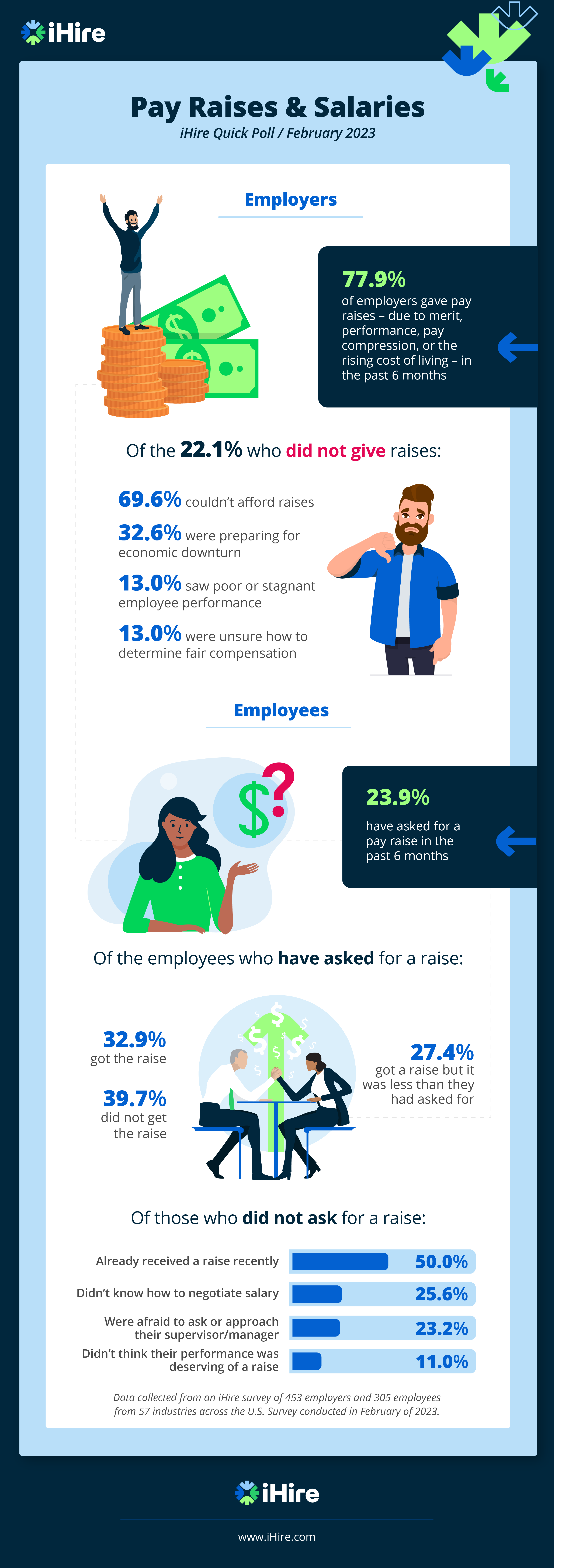- Employer Resources
- |
- Last Updated: March 08, 2023

Nearly 80% of Employers Are Giving Raises. Here's How to Create Your Strategy.
Compensation has been a driving force of the Great Resignation since it began in 2021. In 2022, employers budgeted more for salary increases than in the previous 14 years. According to an iHire survey, 77.9% of employers gave raises in the past six months. However, it wasn’t a case of the squeaky wheel getting the grease, as only 23.9% of surveyed employees asked for a raise (and half of the ones who did not received a raise recently). 2023 seems to project more of the same for employers, which is why having a strategy for giving out or rejecting raises is important.
While pay isn’t the sole factor in employee retention, it plays a big role in whether an employee stays with a company or seeks greener pastures elsewhere. For employers, it’s a delicate balance between making sure valuable employees stay and stretching past your budget to do so. With that in mind, here are a few things to consider when deciding when to give a raise:
Research the Market and Decide Where You Fit
Any worker preparing to ask for a raise knows what they are making compared to the market rate for similar positions. Therefore, if you are negotiating salary raises, you must know as well. Look at your employee salaries (along with their total compensation package), research your competitors and similar companies’ wages, and check the salary range for open positions when available to know where you stand. If you lag the market (below the average salary), you may need to correct that before employees leave for more money.
Bolster Your Budget for Raises
Between April 2021 and March 2022, the median job changer increased their pay by 9.7%, but the median worker who stayed lost 1.7% of their income when factoring in inflation. Giving a 10% raise to your employees is a strain on the budget and might not be financially feasible, but having a comfortable amount earmarked for performance-based raises will allow you wriggle room with workers who ask for a raise.
Find Qualified Talent Today!
Listen, but Be Transparent
Even if you want to give a raise to someone who asks, the budget may not always work. Part of negotiating salary raises is knowing your company’s limit and staying within that range. You don’t need to open your books to everyone who asks for a raise and say, “I have $X left for raises,” but you should be able to explain to your employees how the company makes compensation decisions. This transparency matters in retention as 91% of employees who believe their organization is transparent about pay decisions trust that their employer pays them fairly for their work. If you cannot give a raise or don’t want to give a specific employee one, you need to discuss what needs to happen to change your mind openly.
Prepare to Counteroffer
You may be unable to meet an employee’s number when they ask for a raise, but negotiating salary raises is not a zero-sum game. Consider that 60.3% of surveyed workers who requested a pay increase in the past six months received one, but 27.4% got one less than they asked for. If you can’t hit the salary a worker wants, you can still counteroffer and see if you can hit a mutually agreeable figure.
Be Proactive
Half (50.0%) of workers that didn’t ask for a raise had already received one recently, which speaks to employers being proactive in employee retention. Getting ahead of raising worker compensation is a great way to prevent pay compression and keep valuable employees. It also builds trust between your organization and workers that you are paying attention to and keeping up with the market.
Consider Alternatives to Salary
Some organizations don’t have the budget for significant salary increases, no matter how much they may want to give one. If your company is in that situation, there are other ways to show an employee that you do value their contribution (no, pizza parties don’t count):
- Increasing paid time off
- Providing flexible hours
- Implementing a four-day workweek
- Covering the cost of additional wellness programs
Employers are giving raises or finding other ways to improve compensation because it is vital to employee retention. To learn more about compensation strategies, visit our Employer Resource Center.


Originally Published: March 08, 2023




